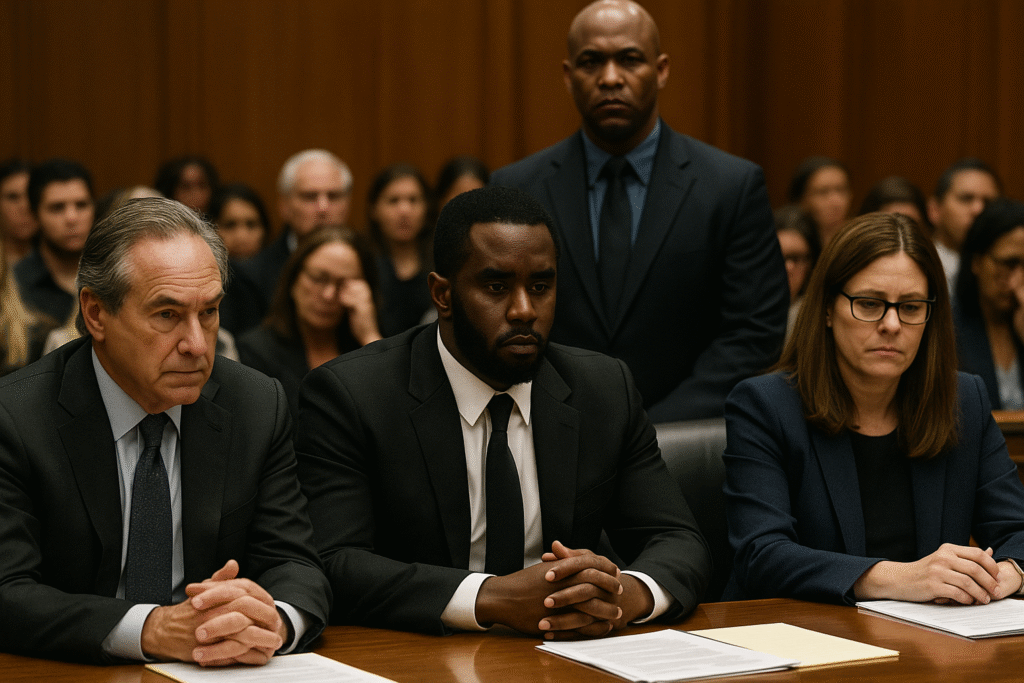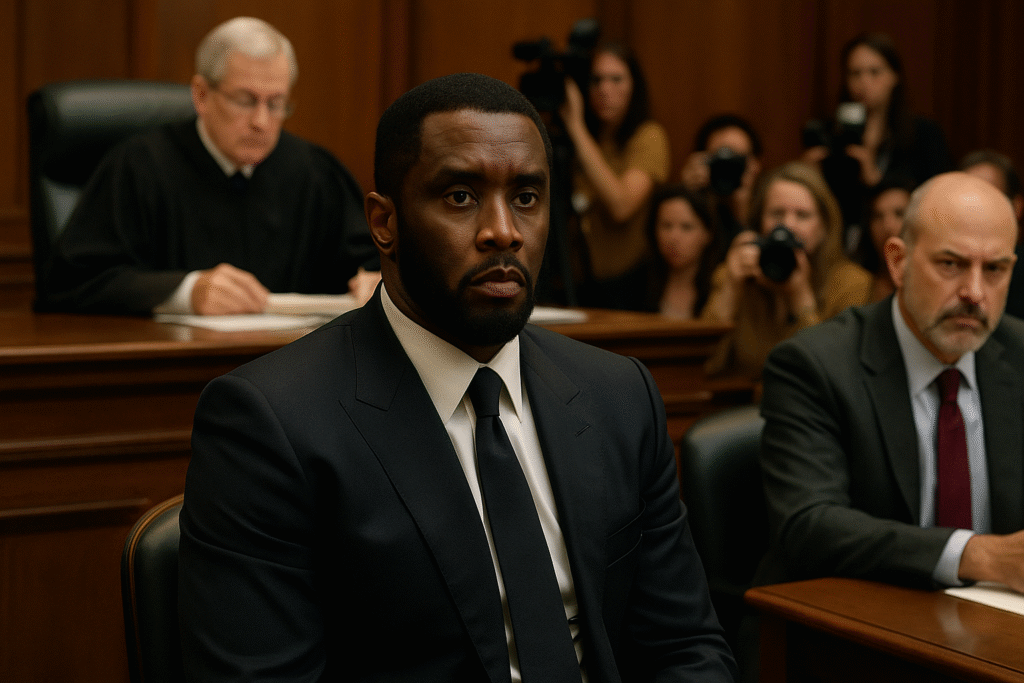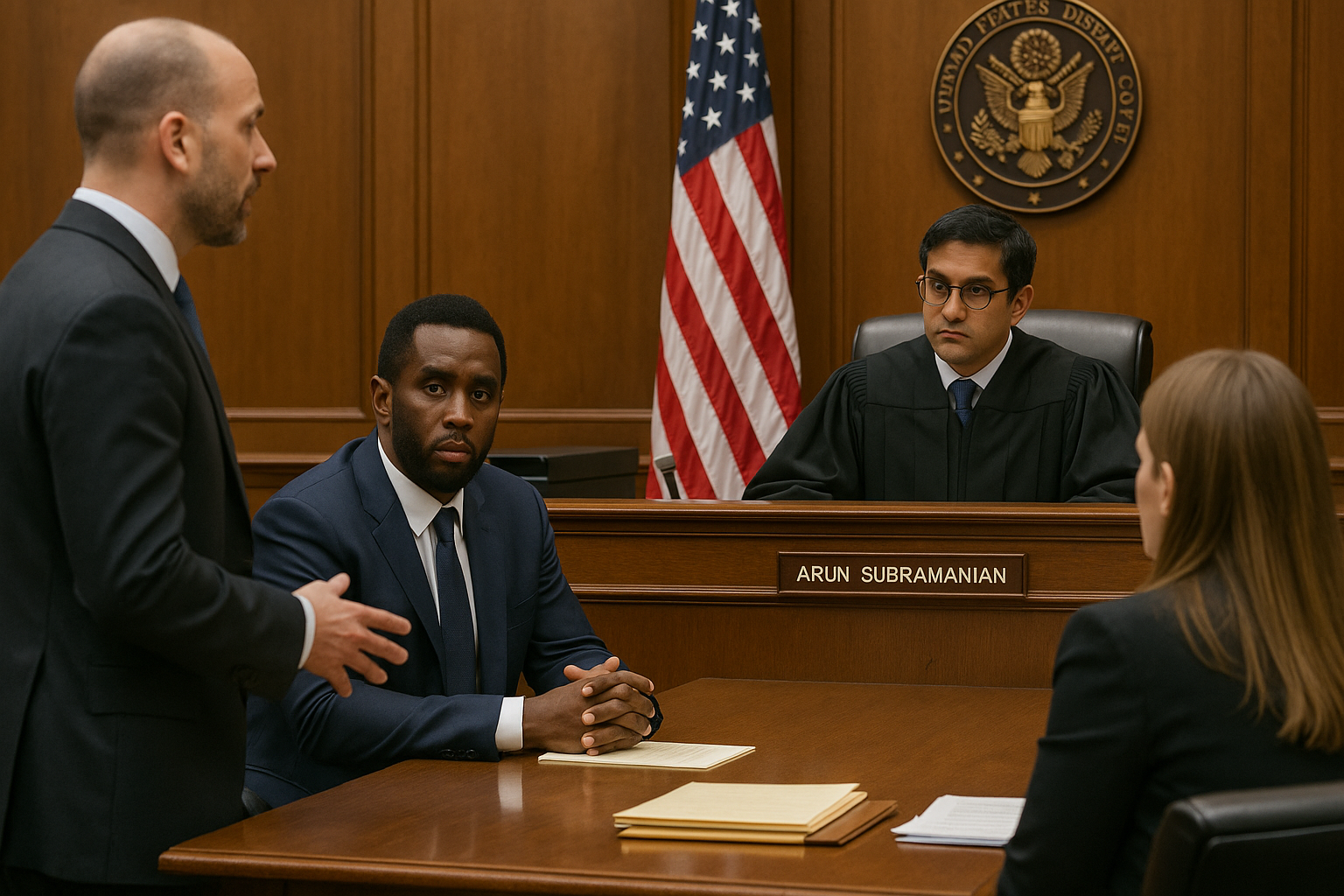Diddy Sentencing: This long-form, verified explainer unpacks the headlines around Sean “Diddy” Combs’s sentencing hearing: the criminal convictions he faces, who the major players are (including Judge Arun Subramanian and reported victims such as Cassie Ventura), what prosecutors and defense asked for, how courts and media are covering the day, and how to follow live updates responsibly.
Why this story matters right now
Diddy Sentencing: Sean “Diddy” Combs — the music mogul long known in the public eye — was convicted in July 2025 on two federal counts for transporting individuals across state lines for the purpose of prostitution (charges prosecuted under the Mann Act). On Oct 3, 2025, he appeared in federal court for sentencing, a high-profile hearing that will determine how long, if at all, he serves in prison for those convictions. The case attracted intense media attention because it mixed celebrity culture, allegations of abuse, and federal criminal law — and because the jury acquitted Combs of some of the most serious charges (sex trafficking, racketeering) while convicting him on Mann Act counts.
1) The core facts — verdict, charges, sentencing date & start time
- Conviction: In July 2025, a jury found Combs guilty on two counts of transporting individuals for prostitution (Mann Act violations). He was acquitted on the more serious racketeering and sex-trafficking charges.
- Sentencing date and time: The sentencing hearing took place in Manhattan federal court on Oct 3, 2025, with proceedings scheduled to begin at 10:00 a.m. ET. The hearing was expected to run through the day and potentially extend into the following week.
- Judge: U.S. District Judge Arun Subramanian is presiding over the matter and will impose the sentence after receiving arguments and victim impact statements.
These are the foundational facts reporters and readers should rely on before wading into speculation or commentary.
2) What the government and defense asked the judge to do
- Prosecutors’ request: Federal prosecutors recommended a substantial sentence — publicly seeking a term exceeding 11 years (roughly 135 months) — arguing that the conduct warranted a significant punishment given the evidence of coercion and the gravity of the offenses.
- Defense request: Combs’s lawyers argued for a far more lenient outcome — a sentence close to time served (they asked for as little as 14 months total, factoring in the time he had already spent detained since his September 2024 arrest). They attached letters, a character video, and a personal letter from Combs to the court asking for mercy and a chance at rehabilitation.
That large gap between prosecution and defense recommendations helps explain why the courtroom day drew intense scrutiny and why Judge Subramanian’s decision mattered, legally and symbolically.

3) Who the key people are (short bios & roles)
- Sean “Diddy” Combs (aka P. Diddy, Puff Daddy): A high-profile music executive and recording artist whose career stretches back to the 1990s. In 2024–25 he faced federal criminal charges stemming from allegations that he arranged and recorded drug-fueled sexual encounters involving escorts and girlfriends.
- Arun Subramanian: A U.S. District Judge for the Southern District of New York (SDNY), appointed in 2023, who presided over the trial and sentencing proceedings. Judges in SDNY frequently handle high-profile federal matters.
- Cassie Ventura (Cassie): The singer and actor Cassie was one of the women whose experiences formed part of the case and press coverage. Her testimony and victim impact materials were part of the record considered by prosecutors and the court. Media reporting has noted her involvement and victim-impact filings.
- Prosecutors & defense teams: The U.S. Attorney’s Office led the prosecution, emphasizing the Mann Act counts and seeking a lengthy sentence; Combs’ counsel argued for leniency and highlighted rehabilitation efforts and time served.
4) What the Mann Act is, and why it matters here
The Mann Act (originally passed in 1910) is a federal statute that, in modern interpretation, criminalizes transporting people across state lines for prostitution or other illegal sexual activity. The counts Combs was convicted of centered on the alleged transportation of individuals — including escorts and women with whom he engaged in filmed sexual encounters known in courtroom testimony as “freak off” parties — across state lines for those purposes. The act can carry significant prison terms; each count has a statutory maximum (the two counts together carry up to decades in aggregate, though judges consider sentencing guidelines and mitigating/aggravating factors in the individual case).
5) The courtroom dynamics on sentencing day (what reporters observed)
Live coverage and press summaries described a courtroom filled with family members, lawyers, and media; the hearing included:
- Victim-impact statements and recorded testimony summaries submitted to the court, some of which described alleged coercive and abusive behavior. One witness who had planned to speak withdrew amid controversy over a defense letter.
- The judge’s consideration of “acquitted conduct.” Even though the jury cleared Combs of certain charges, federal sentencing law allows judges to consider a wide range of relevant conduct (including uncharged or acquitted allegations) when determining a sentence, provided the court finds them by a preponderance of evidence. That legal principle shaped argument and reporting in the hearing.
- A letter from Combs in which he acknowledged past violent behavior, expressed remorse, and said incarceration had changed him — an effort to persuade the court toward leniency. Prosecutors countered with requests for a substantial prison term.
(Readers should note: coverage varies by outlet — these items summarize widely reported courtroom events.)

6) How the media covered the hearing and where to follow live updates
Major U.S. outlets provided live updates, summary articles, and legal analysis throughout the day. If you want to follow such high-profile hearings live or read trustworthy summaries, reputable sources included: Reuters, AP, CBS News, ABC7, Newsweek, and national papers such as The Guardian and The New York Times (live or updated coverage). Network and cable outlets (CNN, MSNBC) and dedicated legal-news services (Court TV) also provided courtroom feeds, analysis, and legal breakdowns. For a real-time feed, look for the live-update pages of mainstream outlets rather than social networks, which can amplify rumors.
Practical viewing tip: streaming live updates usually begin at the official start time (10:00 a.m. ET for this hearing) — check the outlet’s live page or Court TV for their streaming schedule and whether they offer a continual live blog.
7) What this could mean next — possible outcomes and appeals
- Immediate sentencing: The judge will announce the sentence after hearing argument and considering victim impact statements and pre-sentence reports. Sentences can range widely from time served to the mid-to-high years prosecutors sought, depending on how the judge weighs aggravating and mitigating factors. Prosecutors sought more than 11 years; defense asked for a sentence near time served.
- Appeal possibilities: Criminal convictions can be appealed on legal grounds (e.g., trial rulings or jury instructions). The defense has already contested rulings in the case and may pursue appellate review as appropriate. Appeals can take many months to resolve.
Responsible reading & sharing — how to avoid amplifying misinformation
- Prefer primary reporting: rely on professional outlets with live blogs and court reporting (AP, Reuters, CBS) rather than social snippets.
- Avoid citing unverified social posts as evidence — they often misstate timelines and quotes.
- Respect privacy and legal boundaries: some witnesses testified under pseudonyms (typical in sensitive cases). Do not attempt to unmask protected identities.
- Understand sentencing law basics: judges may consider a broad “relevant conduct” record; an acquittal on some counts doesn’t necessarily prevent the judge from weighing related evidence at sentencing. This is a legal nuance often misunderstood in social media summaries.
Verified external links
(These links were active and used as primary sources for the reporting above. Click to read the original coverage.)
- Reuters — Sean ‘Diddy’ Combs to be sentenced on prostitution-related charges for ‘Freak Offs’ (Oct 3, 2025).
https://www.reuters.com/legal/government/sean-diddy-combs-be-sentenced-prostitution-related-charges-freak-offs-2025-10-03/ (Reuters) - AP News — Sean ‘Diddy’ Combs will be sentenced under the Mann Act, a prostitution law from 1910.
https://apnews.com/article/0fd195b5307506f3a1239ba8da7fd0dd (AP News)
Disclaimer
This article is editorial reporting and analysis based on verified media coverage and court filings. All names, charges, and legal descriptions are drawn from reputable news organizations and court records cited above. TrenBuzz does not claim legal authority; readers should consult the primary sources above and official court filings for definitive legal documents. For full verbatim transcripts or case filings, refer to the federal court docket and official court reporters.
